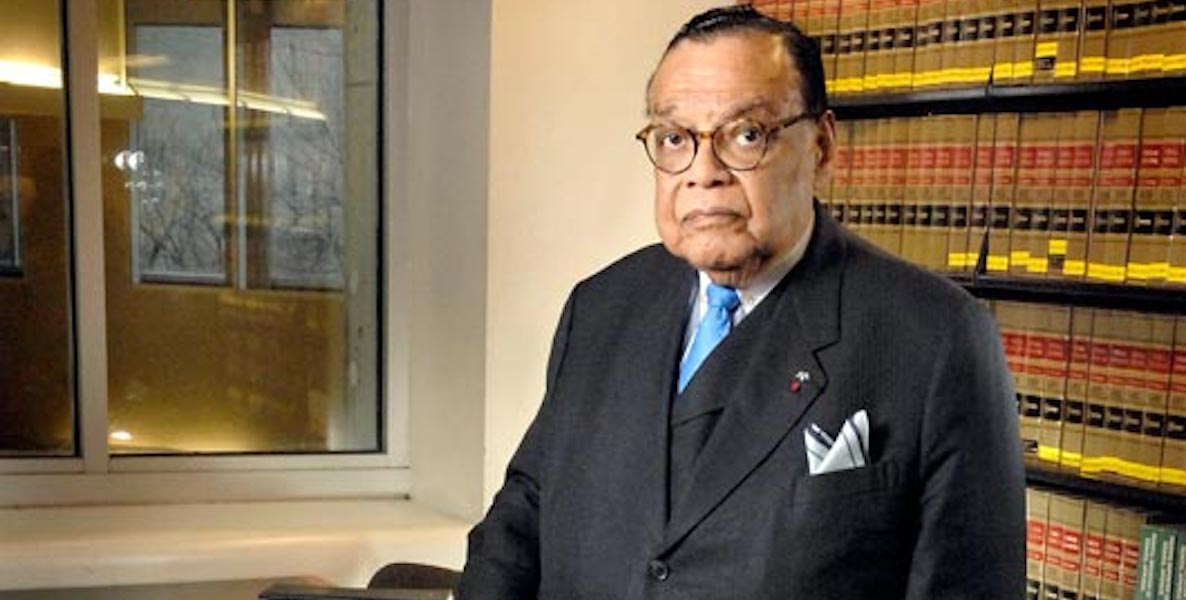When I first considered joining Dilworth Paxson’s leadership team a few years ago, my thoughts immediately went to the unique legacy of the firm. Richardson Dilworth, as iconic a Philadelphian as any in the past 100 years, gave his name not only to the partnership but to the plaza that serves as the public gateway to City Hall. The firm’s catalogue of marquee matters reads like a timeline of the civic evolution of our city, where figures such as Kohn, Kalish, Harmelin and Jacovini loom Rushmore-like over Philadelphia’s legal landscape.
Among these great luminaries who have plied their trade at Dilworth over the years was one whose light shone perhaps the brightest and farthest: Bill Coleman.
Bill Coleman was a rare and inspiring figure who devoted his own ambition and his own propensity for hard work not just to making his own good luck, but to making life better for his fellow Americans, both in his own time and for generations to follow.
In the days following his death at the age of 96 late last month, reverent obituaries of William Thaddeus Coleman Jr. flooded the local and national media. Invariably, these recited the many estimable highlights of his long career in the law: graduating first in his class from Harvard Law after serving in the Army Air Corps during World War II; serving as the first black U.S. Supreme Court clerk under Justice Felix Frankfurter; working as a staff attorney on the Warren Commission; becoming the second black Cabinet member when he was appointed Secretary of Transportation by Gerald Ford; and perhaps most famously, drafting key plaintiff’s briefs in the landmark Brown v. Board of Education case (while at Dilworth Paxson).
As a lawyer in private practice, Coleman was known as a brilliant and indefatigable litigator, a trusted and sought-after corporate board member, and to his junior colleagues, a tough and demanding boss. When Coleman joined the firm, Dilworth Paxson already had a reputation for excellence. He burnished that reputation by demanding perfection.
Coleman achieved a career of unparalleled distinction, and, in the words of my Dilworth partner Steve Harmelin, “led a life that you would dream about.” But for all his talent, intelligence and tenacity, Coleman faced the same kind of prejudice that derailed the careers and lives of so many black men of his generation. As a student at Germantown High School, the swim team disbanded rather than let him join it. After he graduated from Harvard Law and completed his clerkship with Justice Frankfurter, he couldn’t find work at a major Philadelphia law firm until Dilworth offered him a job.
Those injustices and humiliations may have shaped Coleman’s worldview, but they never made him a cynic. Instead, those experiences motivated him to apply his formidable intelligence and legal education to reshape society by changing the law. To paraphrase a quote often invoked by another African American trailblazer, Coleman helped to bend the moral arc of the universe toward justice.
Countless minority citizens saw the prospects of their lives measurably improved thanks to Coleman’s pioneering work in civil rights law, and not just as a result of Brown v. Board of Education.
Countless minority citizens saw the prospects of their lives measurably improved thanks to Coleman’s pioneering work in civil rights law, and not just as a result of Brown v. Board of Education; he also played instrumental roles in cases seeking to overturn anti-miscegenation statutes and end discrimination in educational institutions. Whether arguing before the U.S. Supreme Court, which he did 19 times, or serving as president of the NAACP Legal Defense and Educational Fund, which he chaired from 1977 to 1997, Coleman’s achievements and influence simply cannot be overstated.
I am a person of color and an immigrant, and as proud as I am to be the first Indian chairman of a major law firm, none of those are among the first characteristics I would use to describe myself. I like to believe that whatever success I’ve achieved in my life reflects the rich collage of interactions and collaborations I’ve undertaken with the many visionaries whose paths I’ve been fortunate to cross. Truth be told, I’ve spent more time in the company of entrepreneurs and business leaders than with champions of the marginalized. But the undeniable fact is that Coleman (who, it must be mentioned, was both a champion of the marginalized and a highly successful business leader), blazed the trail that I and so many others walk today.
Bill Coleman was a rare and inspiring figure who devoted his own ambition and his own propensity for hard work not just to making his own good luck, but to making life better for his fellow Americans, both in his own time and for generations to follow.
Ajay Raju, CEO and Chairman of Dilworth Paxson, is co-founder of The Citizen.




